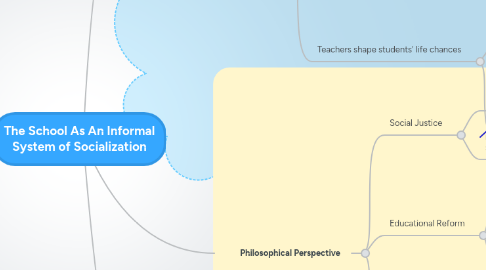
1. Sociological Perspective
1.1. School's are a reflection of Society
1.1.1. Race, class, gender, ethnicity of the people in power influence the structure of the education system
1.1.2. Social, political, and cultural environments and structures of society are reflected in the hidden curriculum
1.1.3. Textbooks exhibit subtle racism through misrepresentation of different groups of people.
1.1.3.1. Racism: A hidden Curriculum (Ratna Gosh)
1.2. Socialization of students
1.2.1. Political Socialization
1.2.1.1. Values and norms of those in power
1.2.1.2. Role of schools in imparting the values and norms of the current structure of society.
1.2.2. Moral socialization
1.2.2.1. Assumed values of society become internalized by students
1.3. Teachers shape students' life chances
1.3.1. Hidden curriculum
1.3.1.1. The way teachers empower or hinder students
1.3.1.1.1. The Education Act and funding
1.3.1.1.2. Example: My older brother has Tourette Syndrome and he had an hindering experience... His school was given funding for his disability but he was basically a regular functioning student and his his teacher implemented a poorly structured program to "help" him, but only ended up belittling him and his abilities. He also dealt with a lot of bullying in which teachers were no help, but embarrassing instead.
1.3.2. Teacher Expectations and perpetuation of social inequality
2. Philosophical Perspective
2.1. Social Justice
2.1.1. Residential Schools
2.1.2. How the education system reflects values and ideologies of society
2.2. Educational Reform
2.2.1. Segregation (in class)
2.2.2. Neocolonialism in the Education system.. Historically this was a product of the influence of Euro-Canadians' values and ideologies. (Aniuk, J.)
2.2.3. Influence of Neo-liberals proposals on educational reform. (Kachur & Harrison)
2.3. Issues related to grading
2.3.1. Grade orientation or learning orientation? (Kohn, A.)
2.3.2. Grades can effect values and attitudes of students...Failure or success based on grades and class rank. (Kohn, A.)
2.3.3. The effect of zeroes can have lifetime consequences.. May result in failing a semester and chances of dropping out raise. (Reeves, D.)
3. Historical perspective
3.1. Challenging Power structures
3.1.1. Educational Reform of teacher training... we should prepare student teachers to question the structure of the education system. (Barakett, J. & Cleghorn, A.)
3.1.1.1. Transformative Education & questioning and challenging the status quo (M.K. Asante Jr. video in class)
3.2. Change in attitudes towards Education
3.2.1. The Penguin Revolution... Rebellion against the education system shaped by Neo-liberalism. (Chovanec, D. & Benitez, A.)
3.2.2. Residential Schools and the Indian Act (in class and articles)
3.2.3. Educational Reform...Restructuring the education system to become more politically neutral.
